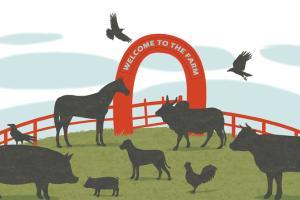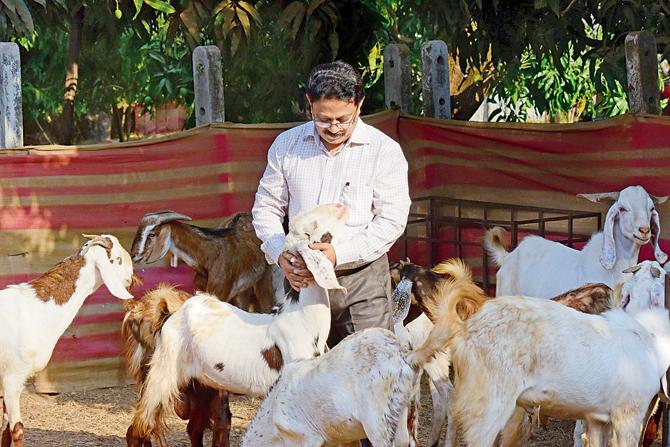A new novel set in Kolhapur and based on George Orwell's allegorical 'Animal Farm', evokes interest, but fails to sustain it

Illustration/Uday Mohite
 A bookj release close on the heels of the general elections held the hope of a timely fresh take on the emerging political landscape. The title of the Marathi book, Indian Animal Farm, provoked curiosity, because it was reportedly premised on the world-renowned Animal Farm allegory written by British novelist-essayist George Orwell. The book cover, depicting a crow perched on a pig, bore a striking resemblance to bygone-but-archived cover jackets of the hugely popular satire, which has been immortalised in 1200-odd editions, which account for 70 foreign language translations, including three versions in Marathi.
A bookj release close on the heels of the general elections held the hope of a timely fresh take on the emerging political landscape. The title of the Marathi book, Indian Animal Farm, provoked curiosity, because it was reportedly premised on the world-renowned Animal Farm allegory written by British novelist-essayist George Orwell. The book cover, depicting a crow perched on a pig, bore a striking resemblance to bygone-but-archived cover jackets of the hugely popular satire, which has been immortalised in 1200-odd editions, which account for 70 foreign language translations, including three versions in Marathi.
ADVERTISEMENT
Animal Farm's notable Indian connect had delighted me as an undergraduate studying the allegory. Its author, in the first year of his life (1903), was raised on a pastoral bungalow-warehouse in Motihari, Bihar, as his father served in the opium department of the British government. In 2003, scenic Motihari's role in Orwell's life was internationally feted when journalists descended on the town to celebrate Orwell's hundredth birthday. Against this backdrop, I was happy that a Sawantwadi-based Marathi writer, Pravin Dashrath Bandekar, had attempted to "localise" or rather experiment with a magnificently long-lived parable, penned almost 75 years ago.

Pravin Dashrath Bandekar, 51, is a left-leaning novelist-poet who prides on his native Konkan heritage. For his new novel, he took recourse to a farm setting in Kolhapur, to convey his disapproval of the war-like situation around him. Pic/Vidyesh Saple.
Bandekar, 51, is a left-leaning novelist-poet, who prides on his native Konkan heritage, which he has celebrated in poetry collections like Yeru Mhane and Khelkhandobachya Navane. His works underline the impact of globalisation on Konkan's folk heritage and indigenous traditions. In the first novel, Chalegat, he focused on the fisherfolk and farmers of coastal Konkan, facing loss of livelihood options. In the novel Ujvya Sondechya Bahulya, the writer attacks religious forces, which perpetuate pseudo-scientific, divisive and exploitative practices in the name of religion.
The new novel (256 pages, Rs 300, Shabd Publication's aesthetically attractive softback) zeroes in on the unfolding current scenario of growing intolerance and use of violence, as a means. The writer is unhappy about the fact that religious-linguistic minorities are compelled to conform to mainstream notions; he feels Indians, as a people, are growing increasingly belligerent in daily lives -- be it forcibly acquiring a piece of land, or declaring war against a religious sub-sect or imposing uniform social norms for diverse populations.
To convey his disapproval of the war-like situation around him, he takes recourse to a farm setting in Kolhapur. "I have deliberately not chosen Konkan because such barnyards are not seen in our countryside," he explains. Since his college days in Vengurla, where he graduated in English literature, he was influenced by Orwell's dystopian settings in Animal Farm as well as Nineteen Eighty-Four. "When I started writing my novel, I was thinking of blending the two, which was difficult. But I have alluded to Nineteen Eighty-Four to a minor extent. One of the characters, Sahebrao Dukkar, resembles the Big Brother," declares the author.
Bandekar's intent is well-meaning and his courage to take on a masterful dramatic devise is praiseworthy, principally in the context of the handful political novels in Marathi. But the good news ends here. He is unable to live up to the form that he claims to adopt. At the outset, he raises expectations by comparing his work to Aesop's Fables, Kathasaritsagar and Panchtantra. He advises the reader to suspend disbelief -- much like children reading fables -- so that they accept animals who talk, plot, kill, lynch and strategise, the way humans do.
India has had an ancient tradition of oral folk tales, enjoyed by children and adults alike, where animals mirror human conduct. The stories are lucid and enjoy a wide reach. Unfortunately, the Indian Animal Farm fails to catch readers' attention. There are times when it drags and one wonders if the writer is struggling with his own metaphors. For instance, animals on the farm watch television channels in which news is brought by sparrows, pigeons and crows; a library stacked with books is retrieved by a bull who mentors younger animals; as a mark of protest against state apathy, animals return their awards, honours and certificates; animals unionise under juvenile sub-groups like Ji Huzoor Party (pigs), Jai Samarth Gang (dogs) and Akhil Indian Govansh Sanghatana for cattle.
Indian Animal Farm is built on a weak foundation. Unlike the original, where a pack of farm animals revolt against a tyrannical owner, Bandekar's farm animals align themselves in competing blocs. It is difficult to gauge why they welcome and believe a new human owner who promises "acche din." The master imposes a code of conduct comprising vegetarianism and cow worship. His agents (pigs and dogs) keep a close watch on other animal movements and assembly. Hierarchies manifest into rivalries, which are beyond logic. Much worse are the complications introduced by the caste factor. Animals are isolated in castes and sub-castes, they are also divided along gender lines. Since physical labour and material gains are not distributed proportionately, the farm witnesses several civil rights agitations. In fact, the story starts with the assassination of a defenseless old horse, who falls prey to "unknown terrorist operatives." It is apparent that the writer is trying to plait multiple contemporary themes, but is unable to tell a coherent story.
Bandekar is a votary of deshivad (nativism), which advocates exploration of indigenous resources and native languages. He believes in using local dialects of Konkan, which is commendable. He is an English literature lecturer in Sawantwadi and has consciously chosen Marathi as his medium. He is eloquent on many social platforms about the beauty of the local idiom, as against a uniform urban 'literary' Marathi. However, the animal speak on his farm, doesn't follow a consistent sutra. Animals speak in the Kolhapuri dialect, while some 'outsiders' babble in Malwani. Conversations start with the local parlance and are midway laced with heavy loaded terms, which strike a jarring note. Also, the writer explains the animal dynamic for the reader, like the way a literature lecturer footnotes a text. It is as if he is not sure if the plotline is clear and therefore, doesn't wish to take chances.
In Animal Farm, language is an important player and an instrument to shape political purpose. The novel has contributed gems to the English language (all animals are equal, but some are more equal than others), and one was expecting something spectacular in Bandekar's tableau.
Animal Farm is a sharp comment on new leaders-administrators, who promise to be different than the old ones, but turn out to be just as decadent or worse. As a political reporter covering elections, riots, commissions of inquiry, trade union feuds, state legislature ses sions and municipal governance, one has witnessed tumultuous phases in the 1980s and '90s when 'true revolution' was believed to be round the corner. Be it Mr Cleans at the helm, or radical government officials at the state-level, leaders promised to reinvent the wheel. It was painful to see them unable to live up to their manifestos and to see some of them fade into oblivion. It was painful to witness individual disappointments eroding the collective belief in social reform. It is equally painful to read a novel that fails in its chosen form.
Sumedha Raikar-Mhatre is a culture columnist in search of the sub-text. You can reach her at [email protected]
Catch up on all the latest Mumbai news, crime news, current affairs, and also a complete guide on Mumbai from food to things to do and events across the city here. Also download the new mid-day Android and iOS apps to get latest updates
 Subscribe today by clicking the link and stay updated with the latest news!" Click here!
Subscribe today by clicking the link and stay updated with the latest news!" Click here!






